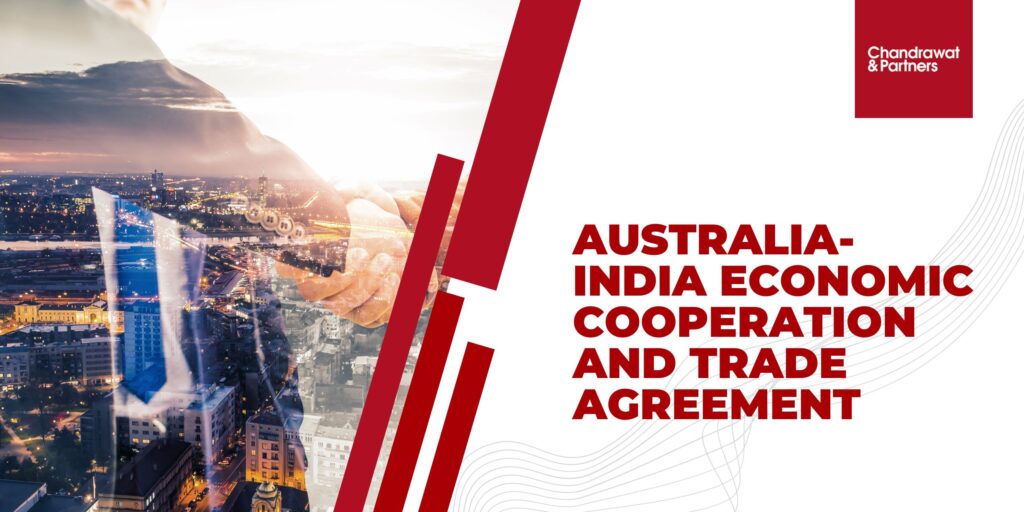Australia-India Economic Cooperation and Trade Agreement – Key highlights
Introduction
Recent years have seen remarkable growth in the trading relationship between India and Australia, fuelled by the many complementarities between the two economies. India is the world’s largest democracy and is a market of 1.3 billion people. Its youthful population, diversified economy, and growth trajectory present significant opportunities for Australian businesses, including in education, agriculture, energy, resources, tourism, healthcare, financial services, infrastructure, science and innovation, and sport.
India and Australia signed an Economic Co-operation and Trade Agreement ( “ECTA”) with an eye on doubling bilateral trade to $50 billion in five years and easing the movement of people, goods, and services across borders.
Significance of the agreement
- Enhanced Exports: Currently, Indian exports face a tariff disadvantage of 4–5% in many labour-intensive sectors vis-à-vis competitors in the Australian market such as China, Thailand, Vietnam, South Korea, Japan, Indonesia, and Malaysia. Removing these barriers under the ECTA can enhance India’s merchandise exports significantly.
- Cheaper Raw Materials: Australian exports to India are more concentrated on raw materials and intermediate products. Due to zero-duty access to 85% of Australian products, many industries in India will get cheaper raw materials and thus become more competitive,particularly in sectors like steel, aluminium, power, engineering, and so on.
- Change in Perceptions for India: The recent trade agreement will also assist in changing perceptions in the developed world, which has always typecast India as “protectionist” and address scepticism around India’s openness to do business with the world.
- Stronger Indo-Pacific: Strong Australia-India economic ties will also pave the way for a stronger Indo-Pacific economic architecture that’s not just based on flows of physical goods, money, and people, but on the basis of building capacity-led connections, complementarities, sustainable commitments, and mutual dependence across countries and sub-regions.
Benefit to Technological services
Australia requires skilled tech staff, while India has a large tech resource pool. The Australian start-up environment requires specialised talent, and India has the advantage of offering skilled personnel that can meet this requirement.
India-Australia collaboration can develop niche skill sets, provide global digital solutions and further develop Fintech capabilities. Large Indian information technology companies can increase their involvement in Australian government projects.
India has several low-cost product-based Software as a Service (SaaS) offerings that can be offered to Australian small and medium sized enterprises. Australia can also serve as the ideal market for Indian start-ups to scale up before launching in the United States of America.
Double Taxation Avoidance Agreement
The Government of Australia has agreed to amend Australian domestic taxation law to stop the taxation of offshore income of Indian firms providing technical services to Australia. The Indian Government has raised the issue of the Double Taxation Avoidance Agreement between India and Australia for the avoidance of double taxation and the prevention of fiscal evasion with respect to taxes on income.
This was a long-pending request of the Indian information technology industry. Once the relevant amendment is made, Indian tech companies would no longer be required to pay taxes on offshore revenues in Australia, thereby enhancing their competitiveness in the international market.
A Double Taxation Avoidance Agreement is often a tax agreement between two or more countries to prevent the double taxation of the same income. If such a treaty has been signed between two nations, it takes effect when a taxpayer lives in one and receives income from the other nation. Ironically, though, this fundamental concept of such agreements was accidentally broken by India’s Double Taxation Avoidance Agreement with Australia. The Double Taxation Avoidance Agreement has been shown to be a sword for the tax authorities rather than a shield for the taxpayer.
Critical Overview
For the past five years, Indian companies, particularly those in the information technology services sector, have been dealing with the consequences of this ruling: litigation, higher taxes in Australia, issues with the availability of foreign tax credits, and a negative impact on their businesses’ ability to render services. To rectify this situation, representations were made to the Indian Government. As a result, Australia’s pledge under the Economic Cooperation and Trade Agreement to fix this issue through domestic legislative reforms is a good development for India-based information technology service providers, who fuel the majority of India’s worldwide service exports.
For more information or queries, please email us at
[email protected]




